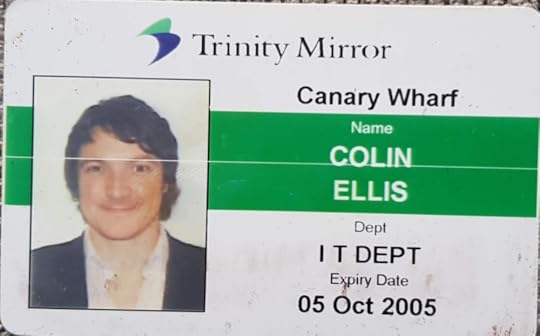Colin D. Ellis's Blog, page 18
March 9, 2025
A case of the Mondays
Of course, having ‘a case of the Mondays’ isn’t a real thing, but the truth is it’s simply impossible for you to roll up to work every day and be 100% committed and engaged. You might be feeling unwell, have things going on in your personal life or be dreading some of the work interactions that you need to have.
However, when you choose to broadcast your bad mood — for example sighing heavily, making cutting remarks, or responding curtly to colleagues — you're not just having a personal moment. You're actively contributing to what organisational psychologists call emotional contagion, where one person's mood can spread through a team like a virus.
In cultures of high empathy, your teammates will give you the opportunity to share and hopefully help to ease how you feel. But there's a critical difference between seeking support and spreading negativity.
It’s every employee’s responsibility to not just bring their technical skills to their work, but also their emotional intelligence. This means understanding that how you show up on Monday (or any day!) shapes the environment that everyone has to work in.
Subscribe to Colin on Culture Sign up with your email * indicates required Email Address *March 6, 2025
The Five Levels of Management Mastery
I became a manager for the first time in 1997 and even though I thought I was ready for it, I really wasn’t!

I’d been hired as a project manager from my sales job with the Liverpool Echo for my ‘people and communication skills’. I was told I’d be managing a small team and that I had to learn on the job. Both about people AND project management!
In the year leading up to this promotion I had invested in a notebook and used it to record the skills that I appreciated in the managers I interacted with. I also noted down any behaviours I’d observed that I didn’t like. I felt that this would give me a head start when I finally achieved a people management role. But it didn’t really.
When I have talked — in interviews and podcasts — about my management journey between 1997 and taking my first truly senior role 10 years later, I estimated that I travelled through five stages of management, which were as follows:
The Navigator — in this stage I was just trying to find my way and understand what the role entailed and how I should ‘be’ with the team and my boss. This stage is a whirlwind where it feels like things are coming at you from all angles and you don’t know what to do!
The Accommodator — in this stage I moved on to trying to please everyone and be their friend. I had some of the basics under my belt and wanted to make time to build relationships. However, I didn’t relish having tough conversations as I wanted to be seen as the ‘good guy’!
The Fluctuator — at this stage I’d been given feedback that I had to be more direct with the team and take them to task when things hadn’t been delivered. Of course, I wasn’t given the skills to do this, so I oscillated between being their friend and being tough on them. It’s the Jekyll and Hyde era!
The Director — once I learned how to have the tough conversations and became comfortable with setting expectations and celebrating success, I set about rattling a few cages! I now had the confidence to be ‘brutally’ honest about situations and although the team appreciated this, my boss didn’t!
The Cultivator — more feedback later (‘We like honesty Colin, just not that honest’) and I’d learned not only how to build culture and communicate to the team about strategic endeavours and necessary process, but also to senior management too in a way that set me out as someone who could have a bright future at the organisation.
Whenever I run management development programs with clients I ask attendees to rate where they believe they are right now. These people have the benefit that most managers don’t, the benefit of education. Middle managers are the difference between organisation success and failure and yet most managers lack the training to make a real difference every day.
This was the situation I found myself in for almost 10 years. Showing up every day trying to do the best I could with the knowledge that I had.
To elevate management impact in your organisation, remember: the best managers aren't born, they're deliberately developed. This one simple action can replace 10 years of learning.
Subscribe to Colin on Culture Sign up with your email * indicates required Email Address *March 5, 2025
Saying no
As humans we are only capable of thinking about and doing so many things within a given period of time. However, our desire to please means that we often forget this fact and overwhelm ourselves to the point of anxiety and stress.
One of the best skills we can learn, therefore, is the ability to say ‘no’ and sometimes, ‘no’ is a complete sentence. That’s not to say that we deliver the message rudely or with attitude, indeed the opposite is true.
It should be delivered in a way that generates discussion about how to free up time to focus on what’s important or else provides the person asking with a swift response so that they can look elsewhere for help. Some simple ways of saying ‘no’ include:
‘I have a full day of productive work planned, but I can plan this in for tomorrow’
‘Which task would you like me to drop from today in order to accommodate this one?’
‘I understand this may be pressing for you, however, this is not a priority for me today/this week’
‘I’ll need to escalate this to my manager to check it’s a relevant priority compared to the other work we have on’
‘No, I’m afraid I can’t accommodate this today’ (and repeat!).
By learning how to say no positively, not only will you be able to make the most of your available time you will also free yourself from the anxiety of being the person that will always take on more work than you have the capacity for.
Subscribe to Colin on Culture Sign up with your email * indicates required Email Address *March 4, 2025
Agency, the culture secret
The results achieved through the workshops that I run are often pretty spectacular. That sounds like the worst humblebrag in history… but the reality is, I don’t do the real work needed to bring about the changes. The gains achieved are a result of the hard work that team members do when they leave the room, not a result of what happens in the room.
And the secret sauce of these workshops is agency.
When employees are given the opportunity to define their own working conditions — how they connect, behave, work together and be creative — they gain not only a sense of pride in what they’ve built, but also a determination to uphold it.
This autonomy generates belonging and drives engagement, productivity, innovation and wellbeing. Organisations and teams that empower their workforce see higher retention, customer satisfaction and a greater certainty over result achievement.
Giving employees agency over their culture isn't just good practice — it's a competitive advantage that transforms outcomes and builds employee experiences worth shouting about.
The question then becomes, do leaders have the courage to relinquish control over the culture and become role models for it instead?
Subscribe to Colin on Culture Sign up with your email * indicates required Email Address *March 3, 2025
Anchored in the past
Stories in the workplace are only useful if they provide the data, insights, learning, motivation or laughter that generates wind behind the sails towards a better future.
Stories that centre around how things used to be or how it was ‘better in the old days’ will keep your culture anchored to the past, where your ship will simply rot until it sinks.
Subscribe to Colin on Culture Sign up with your email * indicates required Email Address *March 2, 2025
Toxic culture and UFOs
What have toxic cultures and UFOs got in common?
In this episode I'm exploring the parallels between toxic workplace cultures and the phenomenon of UFOs, emphasising how leadership often denies or gaslights concerns about toxic behaviours. Let's look at the importance of acknowledging issues, the toxic culture ladder, and the necessity of creating a safe environment for employees to report concerns. I also look at the need for effective crisis management and communication strategies to address and mitigate toxic cultures.
Tune in for insights into:
Denial and Gaslighting in Leadership
The Toxic Culture Ladder
Building a Safe Culture for Reporting
Crisis Management and Communication Strategies.
Listen now Subscribe to Colin on Culture Sign up with your email * indicates required Email Address *February 27, 2025
Winning
There's a world of difference between winning at all costs and fostering a culture of sustainable success. The former breeds toxicity, burnout and ultimately failure, whilst the latter creates an environment where people genuinely thrive.
This was brought home to me last week when I spent the morning at Real Madrid’s Santiago Bernabeu Stadium in Spain. Of course, the stadium is full of history, photographs, memorabilia and trophies. Yet, the thing that always stands out most to me when I’m in these kinds of environments are the stories behind the artifacts. And they speak to the lengths that employees go to to build a strong culture on which continual success can be achieved.

In my 10 years of working with organisations worldwide, I've observed that the most successful teams don't just chase victories – they pursue excellence in everything they do.
It's not about crushing the competition or stepping on colleagues; it's about creating an environment where winning becomes a natural outcome of doing things properly.
Think about it. When your team celebrates small wins, acknowledges progress and learns from setbacks, you're not just building confidence – you're crafting a mindset that seeks improvement in every interaction, every project and every outcome. This isn't toxic competitiveness; it's healthy ambition.
The truly brilliant thing is that this approach creates a self-reinforcing cycle. Success breeds success. Teams that win the right way – through empathy, collaboration, discipline, determination, creativity and a recognition that they are one cog in a bigger wheel – develop an unshakeable belief in their abilities. They're not afraid to fail because they know failure is just feedback.
Remember, culture isn't about winning or losing – it's about how you play the game. But play it right and the wins will come, consistently.
Subscribe to Colin on Culture Sign up with your email * indicates required Email Address *February 26, 2025
The quote that never was
We love attributing pithy quotes to management gurus. It makes us feel smart, connected to their wisdom and gives us something we can repeat in the hope of affirmation from others. But Peter Drucker never said culture eats strategy for breakfast.
What's fascinating is why we desperately want to believe he did.
Because in every office, every sports team, every startup, every Fortune 500 company, we've seen it happen. The perfect strategy, meticulously planned, beautifully presented... and it falls flat. Not because the strategy was wrong, but because the people weren't ready. Weren't willing. Weren't aligned.
That's where a good culture is required.
Culture without strategy is like a ship without a destination. It might have the best crew in the world, amazing teamwork, incredible spirit and you can start in exactly the way that you would like. But ultimately there comes a point when you’re just drifting.
The magic happens when strategy and culture work in harmony together. When culture isn't trying to eat strategy, but rather, when they're at the same table creating something remarkable.
Because that's the hard part. That's the work that matters. That's what separates the organisations that last from the ones that just make noise. Strategic offsites are pointless without a determination to give agency to employees to build the culture to make it matter.
And endless culture initiatives will fail, unless there are strong foundations on which to build.
We don’t need to invent quotes to make the point that culture is worth investing in as much as strategy. We need the courage and determination to build both.
Subscribe to Colin on Culture Sign up with your email * indicates required Email Address *February 25, 2025
Cynics and sceptics
Sceptics are looking for answers. They want to know why, how, when, who and with what. They may have been burned before in believing in an idea that never came to fruition. They may have trusted a leader who failed to deliver. They may be looking for clarity about priorities, so that they can put their motivation where it matters.
Cynics on the other hand are cultural antibodies, attacking any new idea before it has a chance to prove itself. They spread their paralysis through side conversations, messages and eye rolls, transforming inspiration into inertia. And organisations give them fuel because they don’t have the energy to eradicate them.
Sceptics can be your biggest allies if their questions are answered and they’re given agency over their future. Cynics will look to find ways to destroy everything that you’re doing and will never be disappointed with the outcome.
Ridding your culture of the cynics will give you the time and energy to win over the sceptics and, in doing so, create a better future for everyone.
Subscribe to Colin on Culture Sign up with your email * indicates required Email Address *February 24, 2025
Is it still worth doing?
Projects often obsess over spreadsheets, timelines, and budgets. So much so that they are used as the principal measures of success; “Are we still on schedule?”; “Are we still on budget?” are questions that get asked time and again. Yet measuring projects by time and cost is like trying to measure a company's success purely by its operating costs while ignoring its revenue and profit. They don’t tell the whole story.
As a former project and programme manager I realise that time and cost metrics serve important budgeting and resource allocation purposes. I also recognise that they're easy to quantify, aid stakeholder communication and help to identify efficiency problems early. However, they should not be the primary measure of project success.
The Planning Fallacy, tells us we're hopelessly optimistic about project timelines and that’s assuming that they are planned properly in the first place (which most are not!). But the misplaced optimism is also a symptom of a deeper truth: most organisations are measuring the wrong thing.
The real measure of a project isn't the resources it consumes but the value that the change creates. When we fixate on time and cost, we optimise activity for predictability instead of possibility. We choose safer, incremental improvements over transformative or lasting change.
These are the things that fundamentally affect how people view the project and ultimately how it’s led. The best projects are a result of the person that leads it and the environment they create for others to do great work. However, this is only possible if the project team believes that what they’re building can deliver the expected value.
And when the key project metric becomes “Is it still worth doing?” then the focus shifts to where it needs to be: value creation.
For example, consider a project to automate a company's customer service processes. Through traditional metrics:
Original budget: £500,000
Initial timeline: 6 months
Current status: 2 months behind schedule and £200,000 over budget.
But through a value-creation lens, we see:
Customer wait times reduced from 15 minutes to 2 minutes
Customer satisfaction scores increased by 30%
Service agents now handle 3x more inquiries
Expected revenue increase of £2M annually from improved customer retention
Competitors are still struggling with 10+ minute wait times, giving us a market advantage.
When measured by time and cost alone, this project would be labeled a failure. But by focusing on value creation, we see it's delivering transformative results worth far more than the additional time and money invested. The key question "Is it still worth doing?" is answered with a clear yes — the value created (£2M annually) far exceeds the cost overrun (£200,000).
Of course critics will argue that this is a simplistic example and that value creation is often harder to track and measure than time and cost. This is true — but difficulty in measurement doesn't justify ignoring it. Instead, we should develop better frameworks for assessing and tracking value creation. Not crossing our fingers and hoping that endless activity will produce the desired results.
Projects, by their nature, introduce uncertainty into timelines and costs. This isn't a flaw to be eliminated, but rather a signal that meaningful change is happening. The key is to shift our perspective. Instead of asking “Are we on track?” we should be asking “Are we creating enough value to justify continuing?”. And whilst the sunk cost fallacy may eat away at the conscience of senior leaders, the value-creation question must prevail.
When projects are measured by their impact rather than their adherence to initial estimates, organisations can focus on what truly matters — delivering meaningful change that drives lasting value.
So ask yourself, honestly, is the project you’re working on still worth doing?
Subscribe to Colin on Culture Sign up with your email * indicates required Email Address *


